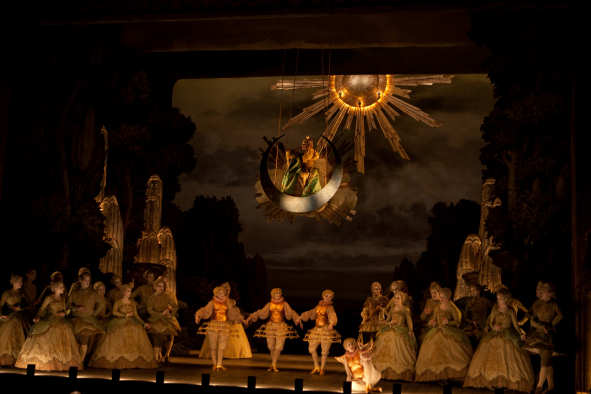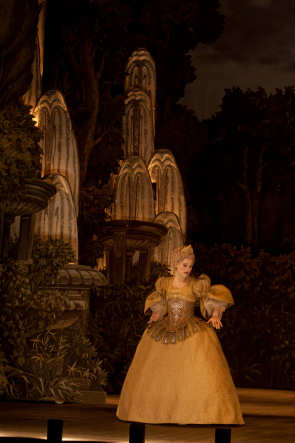Other Links
Editorial Board
-
Editor - Bill Kenny
-
Deputy Editor - Bob Briggs
Founder - Len Mullenger
Google Site Search
SEEN AND HEARD
INTERNATIONAL OPERA REVIEW
Rameau, Hippolyte et Aricie:
Soloists,
Orchestre et Choeur du Concert
d’Astrée. Compagnie Les Cavatines.Conductor: Emmanuelle Haïm.
Théâtre du Capitole de
Toulouse 15.3.2009 (JMI)
New Production
Director: Ivan Alexandre
Sets: Antoine Fontaine
Costumes: Jean-Daniel Vuillermoz
Lighting: Hervé Gary
Choreography: Natalie Van Parys
Cast:
Hippolyte: Philippe Talbot
Aricie: Anne-Catharine Gillet
Phèdre: Allyson McHardy
Thésée: Stéphane Degout
Diane: Jennifer Holloway
L’Amour: Jaël Azzaretti
Oenone: Françoise Masset
Mercure: Johan Christensson.
Pluton/Jupiter: François Lis
The music was the responsibility of Emmanuelle Haïm
leading her Orchestre du Concert D' Astrée, one of the
outstanding baroque groups in France. Ms. Haïm is a true
connoisseur of Rameau’s music and she seems to be totally identified with it,
ever since her time as harpsichord player for Les
Arts Florissants. Her reading
was at the top flight of expectations for
such a special occasion.
Neptune: Jerôme Varnier
Tisiphone: Emiliano González Toro

Jean Philippe Rameau is the great successor of Jean Baptiste Lully in French
music, although his first opera Hippolyte et Aricie was not premiered
until almost 50 years after Lully’s death. This is a
very important work in the music of the time and very
representative of the French baroque, which is so
very different from the better known Italian baroque.
If arias and virtuosity reign in Italian baroque opera,
in French baroque there is a predominance of declamatory
singing, ballet and absence, in general,
of pages of personal virtuosity. In this “battle” between two so
different styles the popular triumph has fallen on the Italian side,
in which I also include Händel,
though not by nationality of course, but for
following the Italian style to the point of becoming
a definite point of reference for
it. The fact that the scales have
not favoured the the French side is no
reason to ignore its important
contribution to baroque music, however.
For the restoration of Rameau's
first opera, premiered when he was already over 50, the Capitole has
commissioned a new production from
the French musicologist Ivan Alexandre, whose experience as stage director is
not extensive. At a time when
stage directors seem so often
distant from the musical work they direct, it is all the more
interesting to witness the opposite. The experience
works very well indeed and opens a very interesting
perspective for the future. Ivan Alexandre offers a 'spectacle'
absolutely faithful to what could be
staged in the French
baroque period, a genuine
return to the work's historical roots. The result is a
brilliant and refined production with a very
intelligent use of painted curtains, allowing
some magnificent and
true “trompe-l'oeil” effects:
from the Erymanthe forest to the great
depth offered in Pluto's Kingdom,
by way of the Temple of Diana, the
Neptune scene in the ocean
and the use of elevated devices for appearances
by the Gods, the whole production works
beautifully. The rich baroque costumes are a beautiful
complement to staging and there is some very good
lighting. Considering that we are referring to French baroque opera, I must
also mention the some exceptional
choreography. In sum, this is a remarkable production
served very faithfully by a wealth of taste.

Aricie: Anne-Catharine Gillet
Although the opera is named Hippolyte et Aricie, the work is based on Racine’s
Phèdre and the true
protagonist is really Thésée, Jupiter’s son and Phèdre's
husband. Hippolyte is Thésée's son
by another woman and is in love with Aricie,
Among the
large cast the French baritone Stéphane Degout as
Thésée excelled particularly,
giving an outstanding performance. In a very short
time, this young singer has developed into
someone of great promise.
Soprano Anne-Catherine Gillet was a convincing Aricie in
every sense, the tenor Philippe Talbot was a
decent Hippolyte and the American mezzo soprano
Allyson McHardy was a very able Phèdre. Jaël Azzaretti
was a very pleasant and outstanding L' Amour. Another
American, the soprano Jennifer Holloway (Diana)
left me somewhat perplexed in the first half, since
her voice seemed too small and almost inaudible at some point. However in the
second half everything changed for the better and she
was once again the good singer that
I remembered from past experiences
of her. I suspect that
having to sing high up on the stage
for the first half could have been the reason for all
this. The rest of the characters have
lesser importance in the plots but all were in general
very well served.
The theater was fully sold out, evident proof of the interest of this
restoration. There was a very warm reception for all
the artists with special tributes
for Emmanuelle Haïm, Stephane Degout and Jaël Azzaretti.
José M Irurzun
Pictures © Patrice Nin
Back
to Top
Cumulative Index Page
